the place where Paleontology and Paleoanthropology meets Philately
Ireland
Fossils and reconstructions of prehistoric animals, Charles Darwin on stamps and postmarks of Ireland
| << previous country | back to index | next country >> |
Contents:
- Country overview
- Philately of Ireland
- Official stamps of Ireland related to Paleontology
- Commemorative postmarks of Ireland related to Paleontology
- Other commemorative postmarks of Ireland to consider
- References
- Acknowledgements
Ireland is an island in the North Atlantic. It is separated from Great Britain to its east by the North Channel, the Irish Sea, and St George's Channel.
Politically, Ireland is divided between the Republic of Ireland (officially named Ireland), which covers five-sixths of the island, and Northern Ireland, which is part of the United Kingdom, in the northeast of the island. In 2011 the population of Ireland was about 6.4 million, ranking it the second-most populous island in Europe after Great Britain. Just under 4.6 million live in the Republic of Ireland and just over 1.8 million live in Northern Ireland.
With the Acts of Union in 1801, Ireland became a part of the United Kingdom. A war of independence in the early 20th century was followed by the partition of the island, creating the Irish Free State, which became increasingly sovereign over the following decades, and Northern Ireland, which remained a part of the United Kingdom. [R1]
Ireland is famous for the large number of fossils of Ice-Age animals, especially Megaloceros giganteus (sometimes called the Irish Elk or Irish Great Dear) found there.
However, due to the fact that Ireland was underwater for most of the period that dinosaurs roamed the earth, it is very little chance that dinosaur fossils would ever be found on the Island.
Hopefully we will see some dinosaur stamps of Ireland in the future.
The postage stamps of Ireland are issued by the postal operator of the independent Irish state. Ireland was part of the United Kingdom of Great Britain and Ireland when the world's first postage stamps were issued in 1840. Oifig an Phoist, the Irish Post Office, was the section of the Department of Posts and Telegraphs which issued all Irish stamps up to 1984. After the division of the Department of Posts and Telegraphs into two semi-state organizations in 1984, An Post took over the responsibility for all Irish postal services including the issuing of postage stamps. [R2]
Official stamps of Ireland related to Paleontology: prehistoric animals, fossils, Charles Darwin
| 11.10.1999 "Extinct Irish Animals" (gummed and self adhesive) | 25.10 2007 "150th Anniversary of the Natural History Museum" | |
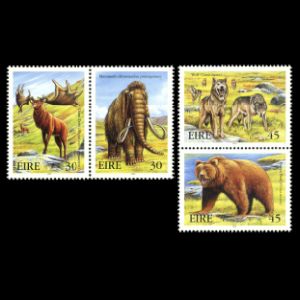 |
 |
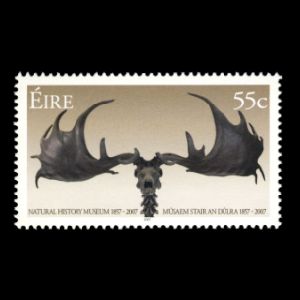 |
| 20.09.2009 "Charles Darwin" | ||
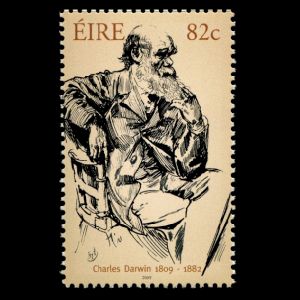 |
|
|
Commemorative postmarks of Ireland related to Paleontology: prehistoric animals
Legend is here| 11.10.1999 "Extinct Irish Animals" [FDC] | ||
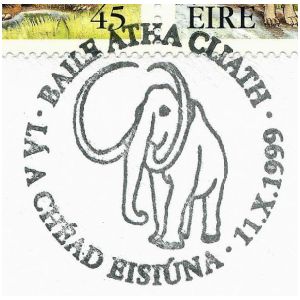 |
|
|
Other commemorative postmarks of Ireland to consider
Legend is here| 20.09.2009 "Charles Darwin" [FDC] | ||
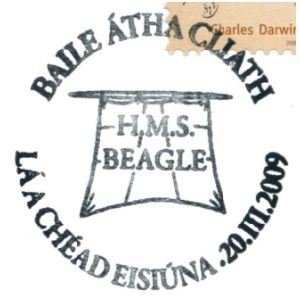 |
|
|
References:
- [R1] Ireland: Wikipedia, WikiTravel, FlagCounter.
- [R2] Postal History and Philately of Ireland:
Wikipedia,
Links to official website of the Post Authority, stamp catalog and a list of new stamps of Ireland are here - [R3] Dinosaur bones discovery in Ireland: SCI News from November 24th 2020, Irish Post from November 25th 2020 (the day the Polish stamps were issued), Irish Times from December 10th 2020, CNN from November 26th 2020.
Acknowledgement:
Dr. Peter Voice from Department of Geological and Environmental Sciences, Western Michigan University, for the draft page review and his valuable comments.
| << previous country | back to index | next country >> |